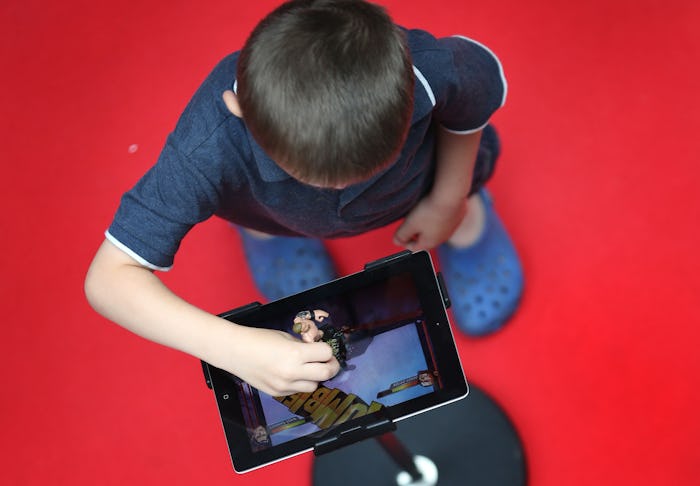Life

Less Tablet Time Might Help Kids Be Better Friends
Everyone has those parents, siblings, grandparents, or friends who say, "Well when I was a kid, we didn't have our own personal screen," or something to a similar effect. Of course, the merits of giving kids less screen-time aren't anything new for parents, and even the American Association of Parents has a recommended time limit that kids should be spending in front of a screen each day, for their own well-being. But now, the benefits of getting your kids away from the TV, iPad, or computer could actually mean more than just better brain development. As one author put it, less screen-time might even make kids better friends.
Adam Alter, an associate professor at New York University's Stern School of Business, claims that the effects of less face-time with phones, computers, and TVs go beyond kids' health. His new book, Irresistible: The Rise of Addictive Technology and the Business of Keeping Us Hooked, discusses the pulls, advantages, and disadvantages technology has on humans. In the book, Alter cites an experiment in 2012 in which several dozen children were sent to camp for a week where they would spend no time with technology. After the week was up, Atler says, the children were more in-tune with their peers' emotions, and were able to better communicate with each other — in a sense, becoming better friends.
To measure those results, the children at the camp Alter studied took an emotional intelligence test twice, once when they first arrived at the camp and were still used to lots of screen time, and then again, when they were about to go home, after bonding and spending time outdoors, socializing, and away from screens.
It's not really too surprising that the children did better on the test (called the Diagnostic Analysis of Nonverbal Behavior) the second time around. In fact, according to Alter, their "error rate dropped by 33 percent."
In explaining his findings, Alter writes that children need time to develop their social skills, and that more communication via screens doesn't help to fine-tune those skills, exactly:
There's a critical period of maturation, when kids stop parallel play and start engaging with other kids, where they pick up the social skills they'll use and hone throughout their lives. If you aren't sitting face-to-face, you never really learn what works and what doesn't and how to discover subtle differences between emotions.
Basically, when kids spend too much time on their screens, it's harder for them to detect differing emotions in other children. And when they immersed in more face-to-face communication, children are more prepared to express empathy, friendliness, and understanding.
Currently, the AAP recommends that children between the ages of 2 and 5 should be getting a maximum of one hour of screen time per day. While parents should figure out their own limits for older teens, Alter's research seems to validate the expression that, with screen-time and kids, less really is more.